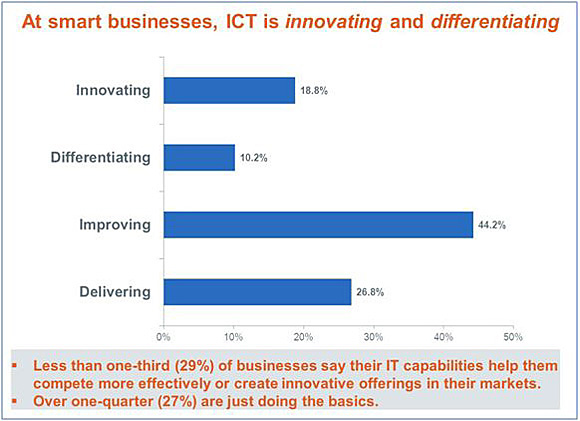S'pore large firms get more out of ICT

SINGAPORE--Some 18.8 percent of local businesses perceive ICT to have contributed at the highest level within their organization, having been the primary driver for innovation, transformation, design and deployment of new business model and services, according to a study by ZDNet Asia.
Another 10.2 percent of Singapore businesses pointed to the next highest level in which ICT contribution was described as "differentiating", while the majority--at 44.2 percent--said their company's ICT adoption as "improving". The remaining proportion, 26.8 percent, judged their organizations' ICT use to be at the lowest level, as "delivering" or simply doing the basics, the study revealed.

In other words, just 29 percent of local businesses said their IT capabilities help them compete more effectively or create innovative services in their markets, noted Angus Macaskill, industry analyst at CBS Interactive, who reviewed the survey findings.
He added that the 18.8 percent of respondents who described their companies' ICT use to be at the highest level, or "innovating", were well positioned to beat competitors that were less advanced in adopting ICT as a strategic competitive weapon.
Macaskill also noted that larger organizations were more likely to enjoy a higher level of returns from their ICT adoption.
According to the survey, some 22.5 percent of businesses with over 1,000 employees assessed the impact of ICT in their organization to be "innovating", while 14.7 percent described their ICT impact as "differentiating".
In comparison, 18 percent of businesses with fewer than 100 employees described the impact of ICT as "innovating", while 9.8 percent evaluated it as "differentiating".
Macaskill said: "Business leaders [in Singapore] clearly see room for improvement in the contribution ICT makes to their results."
"The 71 percent of respondents where ICT is 'delivering' or 'improving' must raise their game to keep up," he noted. "They need to do so not only for the obvious reason their results depend on it, but also to contribute more fully to the transformation of Singapore into the smartest of cities. They can help create a truly intelligent nation, powered by infocomm."
Commissioned by IBM Singapore, the survey was conducted in December 2011 and polled 373 IT executives and decision-makers who were ZDNet Asia-registered members and readers. The study aimed to uncover the views of Singapore executives on how ICT was contributing to their businesses and the progress of their ICT deployments. Respondents were also asked about their views on how the Singapore government's Intelligent Nation 2015 (iN2015) 10-year roadmap had impacted the industry since its launch in 2006.
iN2015 sees mostly positive feedback
Asked to describe the contribution of iN2015 to Singapore's economy, 35.4 percent of respondents said it was making a difference--with 19 percent describing it as "innovating" while the remaining 16.4 percent said it was "differentiating".
Some 71.8 percent believed the 10-year national roadmap had helped their companies by providing better local ICT skills, while 71.1 percent said it exposed their teams to opportunities that would otherwise not exist.
Specifically, 81.2 percent agreed or strongly agreed that iN2015 made Singapore a better place to work, while 78.8 percent said it made the city-state a better place to live in. Another 79.9 percent said it created more efficient banking, while 73.2 percent indicated that it led to "a sense of optimism" about the future of IT in the country.
However, a notably lower proportion, at 55 percent, agreed or strongly agreed that iN2015 created more efficient public utilities such as water and power. In addition, 12.1 percent disagreed or strongly disagreed with this statement, according to the survey. Some 9.9 percent had similar negative sentiments when asked if it helped create more efficient public transport.
Priorities on security, cost reduction
In terms of IT priorities, Singapore businesses ranked security as topmost on their list. Almost three-quarter, or 73.2 percent, of respondents pointed to the need to provide a secure IT environment as a top or major priority.
Some 67 percent indicated reducing overall IT costs as a top priority, while 63.8 percent highlighted the need to improve information management to support more informed decision-making.
Macaskill noted that the strong focus on security reflected the increasing access to IT environments and services by clients and suppliers, as well as the growing volume of mobile devices accessing corporate networks.
He added that the need to reduce IT costs was pushing businesses here to streamline their ICT infrastructure through virtualized, consolidated environments, as well as cloud services.
Mobility also led the way in terms of IT deployment plans for this year.
The survey revealed that 38.9 percent of respondents had already started or completed mobile workforce deployments, while 20.9 percent would roll out similar initiatives this year. By end-2012, 59.8 percent of Singapore organizations would have a mobile workforce.
Macaskill explained: "Mobility services for staff as well as client applications are the primary focus areas for Singapore IT leaders in 2012. Businesses are facilitating the introduction of their mobile workforces through enabling personal devices to access corporate networks, applications and data.
"This development necessitates renewed focus on the security of personal devices, which is consistent with the number one position of security in the list of IT priorities," he said.